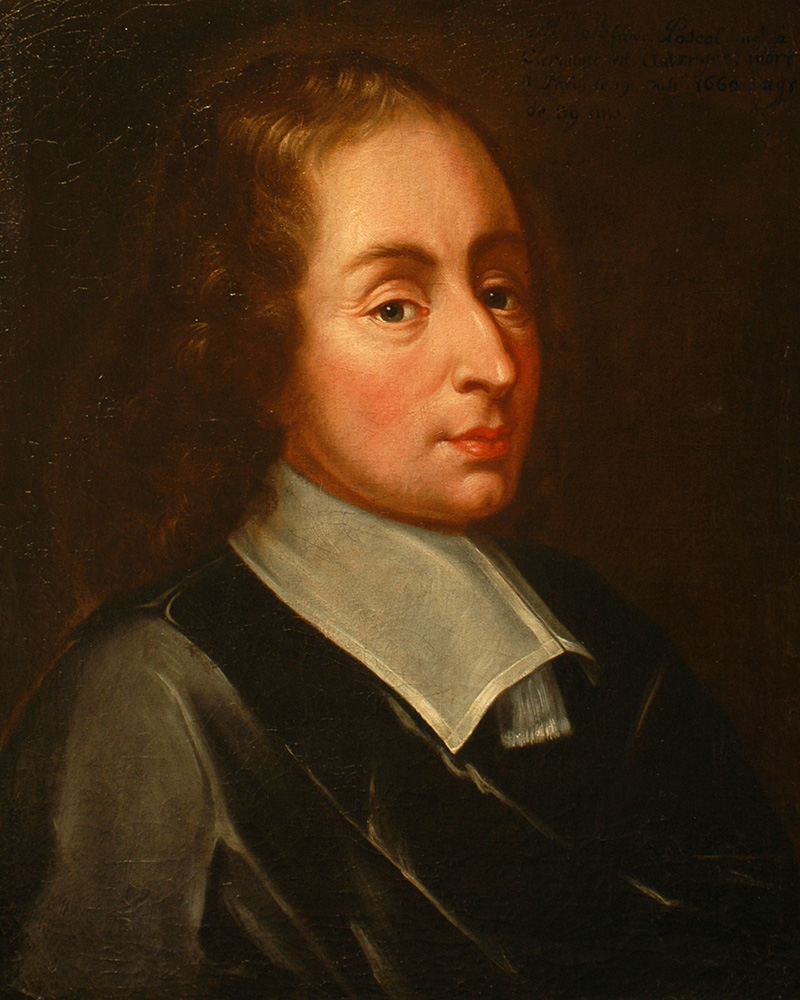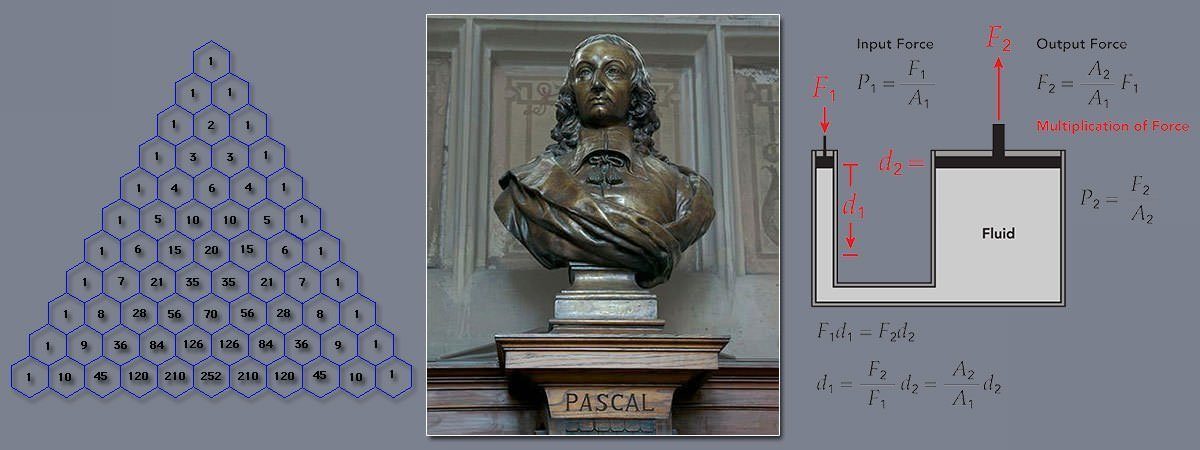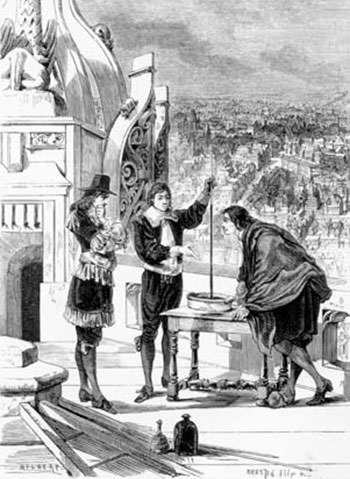Blaise Pascal Discovered That Changes in Pressure
Are transmitted equally through a fluid. Will decrease with depth of fluid b.

10 Major Contributions Of Blaise Pascal Learnodo Newtonic
Pascals law also Pascals principle or the principle of transmission of fluid-pressure is a principle in fluid mechanics given by Blaise Pascal that states that a pressure change at any point in a confined incompressible fluid is transmitted throughout the fluid such that the same change occurs everywhere.

. The law was established by French mathematician Blaise Pascal in 1653 and published in 1663. As the water was poured into the vertical tube Pascal discovered that the pressure from the water caused the barrel to burst. Are transmitted equally throughout a fluid.
Blaise pascal discovered that changes in pressure. 19 June 1623 19 August 1662 was a French mathematician physicist inventor philosopher writer and Catholic theologian. He was a child prodigy who was educated by his father a tax collector in.
Blaise Pascal discovered that vacuums are real and doexist in the real world. Pascals law is a principle in fluid mechanics given by Blaise Pascal that states that a pressure change at any point in a confined incompressible fluid is transmitted throughout the fluid such that the same change occurs everywhere. Blaise Pascal discovered that changes in pressure are transmitted equally throughout a fluid In a hydraulic lift system the output force is greater than the input force because.
-ˈ s k ɑː l ˈ p æ s k əl-s k æ l - KAHL PASS-kəl -kal US. Blaise Pascal p æ ˈ s k æ l pass-KAL also UK. The law was first stated by French scientist and religious philosopher Blaise Pascal.
In physics Pascal is most famous for his work on the pressure of fluids. These inventions are direct applications of his eponymous law. Will depend on the area d.
Pascals law was discovered during an experiment that was allegedly performed in the 1600s. Blaise Pascal discovered the Pascal Principle when he invented the hydraulic press. What is the contribution of Blaise Pascal in physics.
A 10 m long pole was vertically inserted into a barrel that was filed with water. In a hydraulic lift system the output force is greater than the input force because. Philosopher Blaise Pascal.
One of these machineries is the hydraulic. This means that if you have two pistons in one container and apply X amount of pressure on one piston an equal X amount of pressure affects the second piston. In the 17 th century Blaise Pascal discovered that any change in pressure in hydraulic fluid results in the equal distribution of energy in every direction in the fluid chamber.
Blaise Pascal discovered that changes in pressure. Pascals principle has a wide range of application for example in hydraulics such as car brakes. P ɑː ˈ s k ɑː l pahs-KAHL.
A change in pressure at any point in an enclosed fluid at rest is transmitted undiminished to all points in the fluid. Will increase with depth of fluid c. TRANSMITTING PRESSURE - Blaise Pascal discovered that any change in pressure applied at any given point on a confined fluid is transmitted undiminished throughout the fluid - change in pressure at one point in a liquid is transmitted to other points.
Pascals Principle or Pascals Law. He also discovered that the pressure at a point in a fluid at rest is the same in all directions and that the pressure would be the same on all planes passing through a specific point. Today most machineries used Pascals principle in their operations.
Blaise pascal didnt discover Pascals Triangle the Persians and Chinese discovered it. Blaise pascal discovered that changes in pressure a. In physics is his major work wasatmospheric pressure.
When force is applied to a confined incompressible fluid the change in pressure is transmitted undiminished and equally through all parts of the fluid. Blaise Pascal discovered the Pascals principle which states that the pressure applied to a fluid at a point inside a closed system will be transmitted equally in all directions through out the fluid. Pascals Principle in hydrostatics which underlies hydraulic presses and other hydraulic devices states that a change in pressure at any point in an enclosed incompressible fluid is transmitted undiminished to all points in the fluid.
Blaise Pascal born June 19 1623 Clermont-Ferrand Francedied August 19 1662 Paris French mathematician physicist religious philosopher and master of prose. Pascals earliest work was in the natural and applied sciences where he made important contributions to the construction of mechanical calculators and the study of fluids and clarified the concepts. Blaise Pascal June 19 1623 August 19 1662 was a French mathematician physicist and religious philosopherPascal was a child prodigy who was educated by his father.
He laid the foundation for the modern theory of probabilities formulated what came to be known as Pascals principle of pressure and propagated a religious doctrine that taught the experience of God. Are transmitted equally through a fluid. Pascal discovered pressure.
Can you use pressure and pascal in a sentence. Blaise Pascal discovered that changes in pressure Are transmitted equally throughout a fluid In a hydraulic lift system the output force is greater than the input force because. In addition to the SI unit and his law Pascals name also is on a programming language a numbering pattern using a triangle and a philosophical argument about the existence of God Pascals Wager.
Blaise Pascal discovered that changes in pressure are transmitted equally throughout a fluid In a hydraulic lift system the output force is greater than the input force because. Are transmitted equally through a fluid.

About Blaise Pascal Dialectic Spiritualism

Ppt Final Exam S2 Integrated Science Powerpoint Presentation Free Download Id 1587208

Blaise Pascal Wiki Thereaderwiki

10 Major Contributions Of Blaise Pascal Learnodo Newtonic

The Thoughts Of Blaise Pascal By Blaise Pascal

Forces In Fluids Pressure Chapter 12 What Is

Blaise Pascal History And Biography

10 Major Contributions Of Blaise Pascal Learnodo Newtonic

Vacuum Science And Technology The Barometer Experiments Made By Blaise Pascal
No comments for "Blaise Pascal Discovered That Changes in Pressure"
Post a Comment